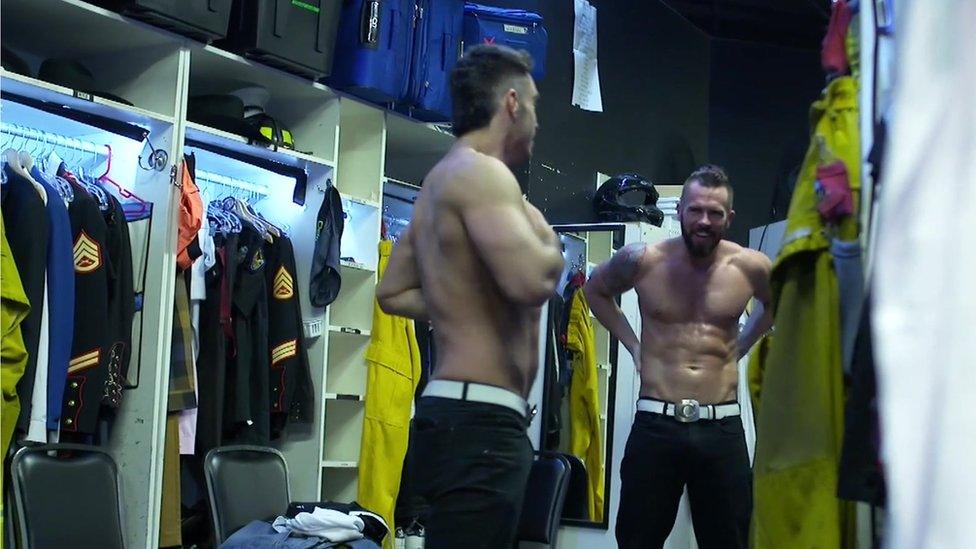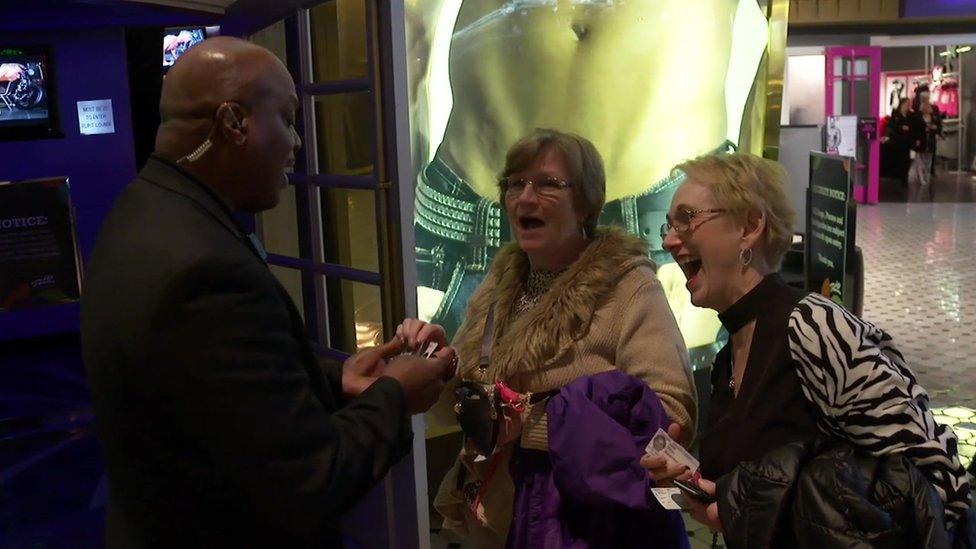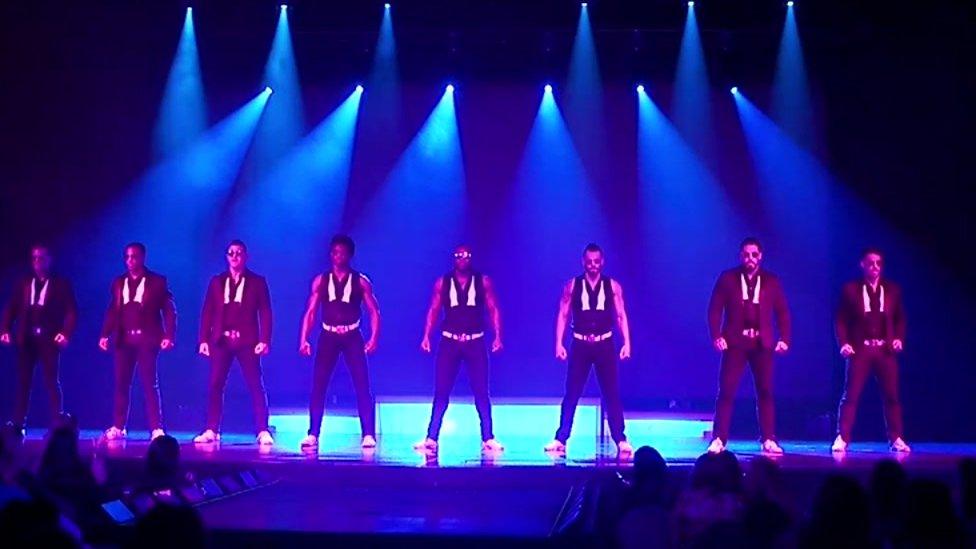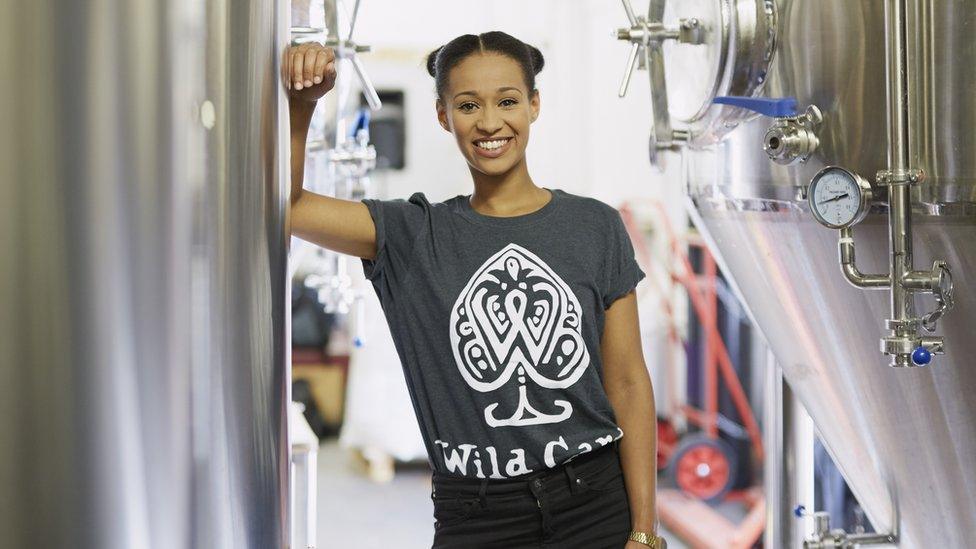Chippendales: Do male strippers feel objectified?
- Published
Chippendales dancer Ryan Kelsey says he doesn't feel objectified
The Chippendales describe their work as "half show, half party" - a male revue that in their words "reveals a little more".
That may be an understatement.
I sat through the first half an hour of the Las Vegas show and saw bare backsides, simulated sex and a game too strange to describe using a banana as a prop. Predominantly, though, it is a dance show - athletic, graceful male figures there to make the audience feel they have the power.
During the course of the evening - encompassing around 15 dance routines and changes of costume that play to a stereotypical female fantasy (builders, firemen, and men on motorbikes) - women are able to participate as little or as much as they like.
Some volunteer to go on stage, some shout from the sidelines, all are encouraged to reach out and touch the men when they do their infamous "crowd run".
"On an average night, how many hands touch you?", I ask Ryan Kelsey, the Chippendales' dance captain.
Unfazed, he says: "Probably somewhere in the 40 to 50 range. Our house [theatre] holds a maximum of 350 so even on a relatively full night we try and move around so everyone gets the maximum Chippendales experience."

Each show can include more than a dozen outfit changes
I ask: "And do you enjoy that - the touching?"
"I love it," he replies. "It's not so much the touching itself, it's the way people are having fun. You walk away, they giggle with their friends. It's more the joy that is created from it rather than the sensation itself."
Let me pause here for a second to explain how on earth I got to this point. A couple of weeks ago I interviewed Piers Morgan for the Radio Times. He was railing against the double standards of the #MeToo movement, the banning of the grid girls - "the new Puritanism".
"You should see how women behave when they're at the Chippendales show," he told me.
"Women paw these guys all night. I can see a big issue down the line with men just getting very resentful and feeling: 'Why is it only about male behaviour?'"
It struck a chord and made me curious enough to drop the Chippendales' agent a line while on holiday in Las Vegas. He agreed I could interview one of his clients to ask if male strip dancers felt the same level of objectification as women did.
All my preconceptions of the "brains in the bicep'' stud are thrown out the window when I meet Ryan. I tell him I have heard tales of women so enthusiastic they have been known to leave bite marks in the Chippendales' legs, draw blood with their nails down the spine.

The Las Vegas show draws women of all ages
"It's very rare, but it does happen," he confirms. "It's usually not from a place of malice or weird intent - it's just kind of not knowing where the line is."
"Is it painful?", I ask.
"A scratch is a scratch," he confirms. "But I know where I work. I understand that even though that's not really in our rules, that is in the scope of possibility. If you feel someone start to do it again, you instruct them: 'You can touch, but don't do that.'"
So does he see himself as having the same job as female strippers?
"No," he says. "We are first and foremost a show, and we have no tipping at our show so there's no dollars."
This is important because nobody can feel like they are buying the dancers, singling them out, asking for attention, or favours or, ultimately, sex.
He continues: "You can't influence us. [You can't say] 'Oh my God this lady's loaded, she's throwing out 20 dollars, she's throwing out hundreds.'

Audience members can come on stage in the show, which also sees the dancers go amongst the crowd
"If you gravitated towards that then maybe someone who saved up for weeks to get this trip would get ignored. We wanted to avoid any situation like that so we like [equality] throughout the room."
It is a reminder how central financial power is to this whole debate.
The #MeToo movement has raised awareness of the way women have been abused or objectified.
Does the same question need to be asked about men in these kind of roles?
He has nothing but praise for the movement - he feels he understands his own female friends so much better now.
"I think it's a little different," he says. "We are voluntary participants.
"This isn't you going about your day, getting a coffee or even thinking you're on a nice date. You're not getting forced into a corner with your back - theoretical or literal - against the wall trying to escape.
"I choose to be employed here so I think just participating in that way changes the dynamic."
I pursue: "Do you feel objectified?"
"No, because I'm participating," he replies. "Objectification means someone's reducing you against your will - this is not against my will."
I am wondering how he feels about recent workplace developments: Formula 1's banning of the "grid girls". Or the darts "walk on girls". What about boxing's "ring girls" in Vegas?
"It's complicated," he acknowledges. "Because if any one of those girls was proud to do that, proud to be there, proud of their body - enjoying the money, thought it was easy, and were there 100% voluntarily then it's hard to argue against it.
"That said, with all these stories coming out, things have been wrong for so long that we might need to overcorrect for a while before we find the middle ground.
"As a whole, females have been pushed back or objectified so many times, so often, that things that personify the old guard might have to drop off for a while."
It is thoughtful, it is considerate, and from what I see, it is genuinely felt.
For more on this story, watch Emily Maitlis's report on BBC Newsnight at 22:30 GMT on BBC Two - or catch up afterwards on iPlayer.
- Published14 January 2018

- Published9 February 2018

- Published2 January 2018

- Published18 February 2018
